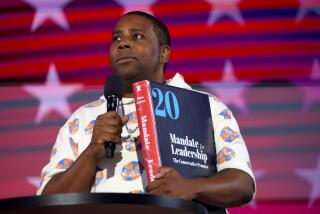Toxic Waste Report Accepted by Governor, Hit by Democrats
SACRAMENTO — Gov. George Deukmejian’s toxics task force Tuesday called for the elimination of untreated hazardous wastes in landfills and ponds, but legislative Democrats immediately pointed out that the governor had vetoed bills that would have accomplished many of the group’s recommendations.
In accepting the task force report at a ceremony, Deukmejian hailed the document as a significant accomplishment and said that the task force “proved to the doubters, to the cynics, to the complainers that positive nonpartisan action on toxics is not an impossible dream but it really is a moral imperative.”
But Democrats, led by Assembly Speaker Willie Brown of San Francisco, charged at a press conference later that the document was long on election-year rhetoric, short on substance and a listing of generalities rather than a “blueprint for change.”
Deukmejian and his likely Democratic challenger in the governor’s race, Los Angeles Mayor Tom Bradley, are in the midst of an increasingly bitter campaign in which toxics has become a major issue. Likewise, Deukmejian and Assembly Democrats long have been at loggerheads over how the state should wage the battle against toxic wastes.
Brown’s Charges
Brown said Deukmejian “regularly vetoed” measures intended to deal with the toxics issues and accused him of “operating an Administration that has failed totally and completely to administer the programs that the Legislature has put in place.”
The Deukmejian task force endorsed pending legislation by Assemblywoman Sally Tanner (D-El Monte) that would force local governments to agree on sites in their own jurisdictions for treatment and disposal.
But the Democratic legislators pointed out that Deukmejian has twice vetoed earlier versions of the Tanner bill. The lawmakers also faulted the governor for vetoing three other bills that would have ended the land disposal of untreated waste, including one last year by Senate President Pro Tem David A. Roberti (D-Los Angeles).
The chairman of Deukmejian’s task force, UC Riverside Chancellor Theodore L. Hullar, said the report “represents a fundamental change in the way the nation looks at hazardous waste,” and includes suggestions for innovative alternatives to dumping hazardous wastes in landfills or holding ponds.
The task force reached a consensus on 73 recommendations, calling for expanded state-financed research and demonstration projects as well as the gradual elimination of land disposal of untreated toxic waste.
Deukmejian announced the formation of the task force last November, shortly after it was reported that the FBI was investigating the Administration’s handling of toxics cleanup contracts.
The governor’s task force suggested setting 1992 as the target date for reducing by two-thirds the estimated 1.8 million tons of toxic waste that is generated each year by California industry. Some of the waste would be burned and some neutralized.
Hullar stressed that the state will have to take a lead in developing permanent storage for the treatment residues. But because everyone in the state benefits from the industry that generates the waste, he said, each region of the state must accept treatment and storage facilities “in everyone’s backyard.”
The membership of the task force originally included Administration officials, industry representatives, environmentalists and four legislators.
But one task force member, Sen. Art Torres (D-South Pasadena), asked that his name be removed from the final report because Hullar refused to attach a statement of dissenting views. On Tuesday, Torres faulted the task force for avoiding some major toxic issues, including drinking water contamination, leaking underground storage tanks and financial liability for injuries to the public.
“When you have a consensus you have a lovely tea party, but nothing other than that,” Torres said.
Hullar explained that in areas where members could not reach a consensus, the report included a discussion of opposing views with no final recommendation.
Deukmejian released a letter to Torres faulting him for failing to attend task force meetings after the initial session. Torres, who chairs the Senate Toxics and Public Safety Management Committee, said members of his staff regularly attended the hearings and briefed him.
More to Read
Get the L.A. Times Politics newsletter
Deeply reported insights into legislation, politics and policy from Sacramento, Washington and beyond. In your inbox three times per week.
You may occasionally receive promotional content from the Los Angeles Times.










